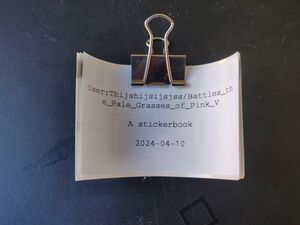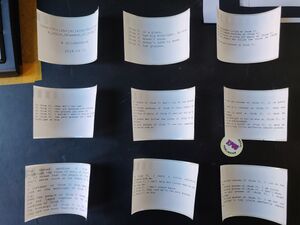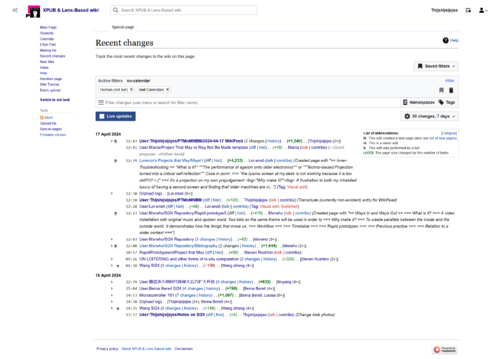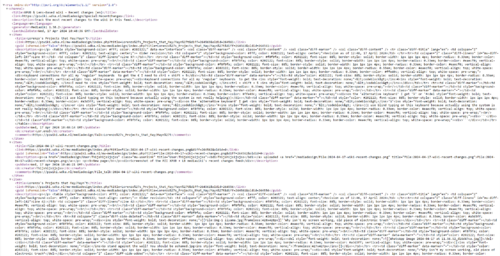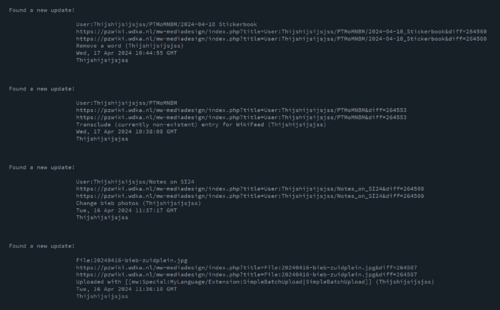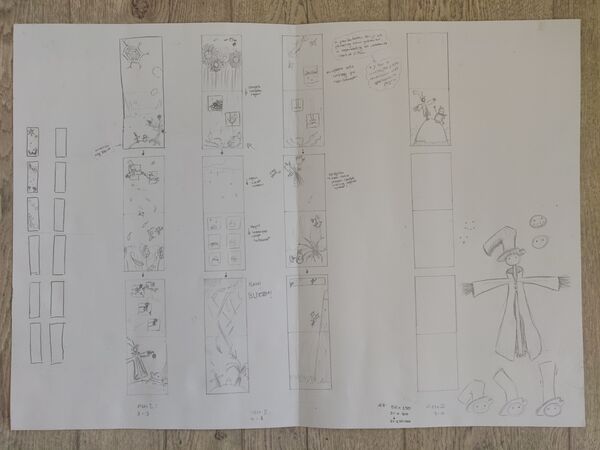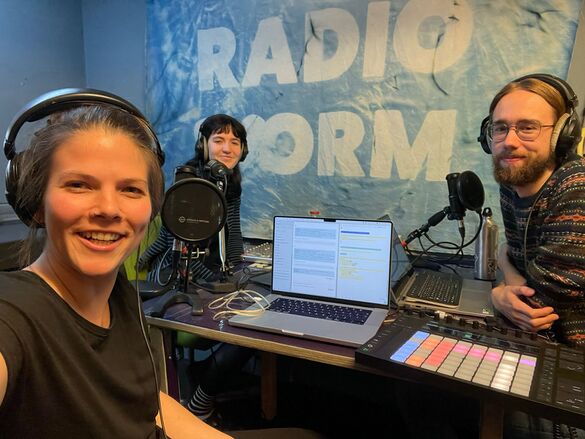User:Thijshijsijsjss/PTMoMNBM: Difference between revisions
(Transclude (currently non-existent) entry for WORM open call) |
(Add some prompts) |
||
| Line 8: | Line 8: | ||
* [[User:Thijshijsijsjss/Web-to-Print_and_Play|Web-to-print and play]] | * [[User:Thijshijsijsjss/Web-to-Print_and_Play|Web-to-print and play]] | ||
* [[User:Thijshijsijsjss/Albumhoes|A series of album covers for a band that doesn't exist]] | * [[User:Thijshijsijsjss/Albumhoes|A series of album covers for a band that doesn't exist]] | ||
* A short film narrated by a pen plotter (ref. [https://www.rogierarents.nl/ Secret Signals by Rogier Arents]) | |||
* A real time animation by a pen plotter | |||
=[[/2024-04-10 Stickerbook|2024-04-10 Stickerbook]]= | =[[/2024-04-10 Stickerbook|2024-04-10 Stickerbook]]= | ||
Revision as of 21:16, 26 May 2024
A repository of projects that may or may not be made.
Prompts
A living collection of Prompts That May or May Not Be Made Into a PTMoMNBM
- A video game that does not exist
- Web-to-print and play
- A series of album covers for a band that doesn't exist
- A short film narrated by a pen plotter (ref. Secret Signals by Rogier Arents)
- A real time animation by a pen plotter
2024-04-10 Stickerbook
What is it?
> A stickerbook: a small (pocket-sized) book with written text where each individual page is a sticker.
Why make it?
> What happens to a book with a missing page? If all pages are missing, is it still the same book? Is it still a book at all? How much is the narrative of a book contained in it's physical form? > There is a suggestion of these pages not having a 'proper' order, in the sense that they can be taken and rearranged if a reader so desires. > Sometime I want to share a page from a book, or remove one from the whole, or keep one with me. Additionally, I wonder what
Workflow
(> Zeroeth, research must be done into the method of stickerization: how might one make the stickers? How can these pages be bound together if so desired? Etc) > First, a text needs to be settled on. It can be an already existing text, or something new. > Next, the text needs to be formatted in a way to accomodate for the eventual stickerization. > Then, stickers need to be made. > Finally, optionally, the sticker-pages can be bound together.
Timetable
> The are two major factors in the timeline: 1. the text. If this text is to be created from scratch (maybe specifically for the purpose of this project), this will be the bulk of the work. 2. the stickerization. If this is done elsewhere (e.g. through an online service), shipping times should be taken into account. > All in all, the project should not take longer than 3 days (excl. shipping time): 1-2 to write, 1 to bind. If stickerization is done by self, this happens in between.
Rapid prototypes
A rapid prototype using this story made with the Brother QL-700 label printer.
Previous practice
> Building on questions of narrative and interaction in a static medium. Continuing explorations of printed matter.
Relation to a wider context
> It is a reference to stickerbooks that contain no text, but stickers figures.
Choices made
> Choices must be made on: * Page size * Fixed page size? * Include instructions? * Page numbers (yes or no) * ...
Talking with Mania, Victor and Zuzu
When someone finds a sticker, can they find the rest? (physical locations of other stickers? Link to full text?)
Alsmost becomes a game to find the rest of the book, like geochaching. Rewarding to find a sticker already, even without considering the contents of the text.
The sticker format implies a spatial format. The book is read 'in space'.
2024-10-17 WikiFeed
What is it?
An app for your mobile device reading RSS feeds from our community wiki. A user downloads and installs the app, logs in with any valid user account, and is able to select any type of feed they want to watch. They could do this in the app. Also, they can enable alerts, alerting them on specific wiki updates.
Why make it?
The wiki is a content feed. I notice myself checking the recent changes all the time, partially triggered by a feeling akin to 'doomscrolling'. In contrast to more conventional media platforms, a wiki is seemingly archaic, static, factual and 'uninteresting' to our dopamine dependent brains. WikiFeed comments on this.
Aside, it has practical use cases, too. Currently it is possible to view the revision history of specific pages on the wiki itself, and view a feed of recent changes. This is convenient information to have. However, sometimes you want this information outside of the wiki. For example:
1. A pop-up notification on your phone when a specific page is altered
2. Display up-to-date content from a specific set of pages
Workflow
[I'm unsure whether the intention for this section is describing the workflow making the project, or using the project. I will go for the former] The workflow consists of four stages: research, coding, designing, polishing. They are described in more detail in the Timetable section.
Timetable
1 day of research into the mediawiki api: what can we extract and how?
1 day of research into the development platform: what is a suitable suite for developping for mobile?
1 day getting familiar with this suite, playing around, prototyping some tests
2 day to get the core functionality working
- compiling feeds
- selecting feeds
- switching between feeds
- adding to feeds
2 days for the design
2 days for polishing and adding nice-to-have features
Rapid prototype
A very rapid prototype made with Processing, just to get a feel for extracting the feed through external software, and displaying it there.
XML xml;
void setup() {
xml = loadXML("https://pzwiki.wdka.nl/mw-mediadesign/api.php?action=feedwatchlist&wlowner=USER&wltoken=TOKEN");
//println(xml);
XML[] items = xml.getChildren("channel")[0].getChildren("item");
for (int i = 0; i < items.length; i++) {
println("Now printing a new item!");
String title = items[i].getString("title");
println(items[i].getContent());
println();
}
}
Previous practice
WikiBabble: a project that uses the community wiki as a messaging platform. It plays with the dynamics of personal and intimate chatting on an inherently public platform. WikiFeed can be an extension to this project, serving alerts like most instant messagers do. TL;DR: a project in which logged and unlogged activities of and surrounding the community server chopchop are compiled, annotated and displayed on an E-reader. In the making of this project, we considered using a collection of wiki pages to store information. This would have made use of the feature that any user can edit any page. Finally, I'm an avid user of this wiki, and would like to explore more possibilities with it. In particular, I have kept a diary that I have been told reads as quite intimate. WikiFeed could explore these 'intrusive tensions' even more.
Relation to a wider context
awef
Useful links:
Feed of USERNAME's watchlist: https://pzwiki.wdka.nl/mw-mediadesign/api.php?action=feedwatchlist&wlowner=USERNAME&wltoken=TOKEN TOKEN is obtained by logging in to the wiki > preferences > Watchlist > Manage tokens Feed of changes of a specific page: https://pzwiki.wdka.nl/mediadesign/PAGENAME?action=history&feed=rss e.g. https://pzwiki.wdka.nl/mediadesign/Main_Page?action=history&feed=rss Feed of all recent changes: https://pzwiki.wdka.nl/mw-mediadesign/api.php?action=feedrecentchanges&feed=rss
Talking with Alessia, Mania, Victor and Zuzu
- Could lean into the commentary aspect
- References on doomscrolling commentary?
- 'Reading feeds' can mean different things -> could operate an Arduino for example
- Collaborative?
2024-04-28 Pen Plotted Illustration Book
What is it?
An illustration book telling a story in about 12 spreads, handbound and all pen plotted.
Why make it?
I find illutration books to (try to be) be intimated experiences. However, their mass production and particular materiality often creates a distance for me that inhibits me from fully experiencing this intimacy. Glossy pages, hard covers. The illutration book becomes a pristine object that cannot and should not be damaged. Should not be interacted with in playful ways. All the while, often the the stories they portray allow for a sense of curiosity and wonder that text-based books sometimes lack. There is a dissonance between the playful attitude of the content, and the static pompousness of the format. A pen plotted illustration book can provide a more harmonic outcome. While there is cooperation with machine, there is still a handmade quality to pen plots. And due to the quirks of plotting, every plot is unique. As a method, it embraces playfulness (and seamfulness). Finally, such a book could highlights many techniques of pen plotting, and in that way also serve as a nice overview for someone interested in this practise.
Workflow
1. Make the story
1.1 Create a narrative
1.2 Create concept art for characters and environments
1.3 Create a storyboard
2. Make some decisions
2.1 Decide on the method(s) of illustration
-> For example, multicolor crosshatches, stippling, vector outlines, ...
2.2 Decide on the binding technique
-> For example, stapled, thread sewn, glue binded, ...
2.3 Decide on the issue size
3. Illustration files must be made
-> This can include drawing and coloring by hand, and converting this to pen plottable illustrations.
4. Pen plotting
5. Binding
6. Distributing
Timetable
Yet to be determined.
Previous practice and Rapid prototypes
I have a previous practise both in pen plotting and in storyboarding for illustration-based stories. I will pull from this to provide this proposal with prototypes. This project is supported by three prototypes: 1. A storyboard prototype. This storyboard I made in October 2022 and might serve as a basis for this illustration book. 2. A pen plotting prototype, to see what some of the pages might look like. For exampes for one specitic technique, see for examnple this page. 3. A binding prototype. For this, I don't have a prototype currently.
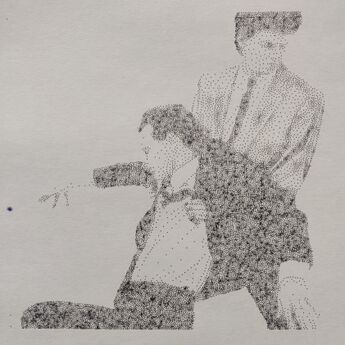
|
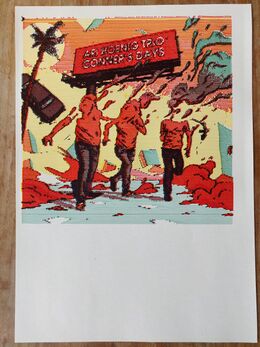
|
Relation to a wider context
This projects relate to the wider practise of pen plotting, and the multiplicity of methods and results they invite. There are few pen plotted publications, and a publication for pen plotted illustrations is, to my knowledge, novel. Additionally, we live in a society of fast paced consumption. In some ways, this behaviour is already being taught at a young age. Projects that cater to children should be aware of this.
Choices made
- story or 'fragmental'? - with or without text? - aimed at children, or not specifically?
2024-05-15 WORM Open Call
What is it?
A project of 3 months investigating through pen plotting the intersection between algorithms, obsolete media and community building in a series of 3 publications that are each accompanied by a release event at De Boog and a radio show at Radio WORM. It is a collaborataion with Alessia and Victor and will run from September to November of 2024.
Why make it?
Alessia and Victor and I have been experimenting with pen plotters over the past few months, establishing an experimental practise and finding these machines to be inviting for community building efforts. WORM / Amarte now has an open call with the theme 'algorithms' that aligns with our interests, and seems to allow for further investigation into our established and new methodologies alike. In a conversation about 'algorithms', it is important to consider the ecological aspects obsolete media (like pen plotters) confront us with, as well as the curious, performative and physical experience they provide.
Workflow and Timetable
There's a lot to flesh out for this project. As it is on spannign multiple months, and due to the nature of our methods, part of the fleshing should happen during the run of the project. This is hard to capture in a timeline. A very rough schedule of main events could be something like this:
* before September:
Commuinicating our visions with WORM.
Talking to the people from the other 3 projects.
Deciding on the content outlines for the publications, the focus.
* Start of September:
Setting up at De Boog.
Event launching the project
Optionally: a radio show launching the project
* End of September:
Event launching publication #1
Radio show #1
* End of October:
Event launching publication #2
Radio show #2
* End of November:
Event launching publication #3
Radio show #3
Previous practice
At XPUB, we have been experimenting with Pen plotters a whole bunch, investigating their multiplicity. For example: * User:Alessia/Pen_plotter_magic * User:ØverLørd/Complot * User:Thijshijsijsjss/Pen_Plotting_Panache Also, we have helped organise several events dedicated to pen plotters: * A Pen Plotting Party in Rotterdam, 2024-02-12. Website, photo documentation, video documentation. * A Pen Plotting Party in Brussels, 2024-05-04, in collaboration wtih OSP. website. Aditionally, we have experience with Radio WORM through SI22.
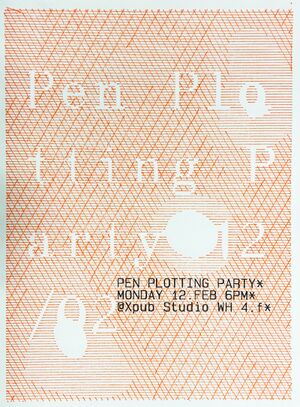
|
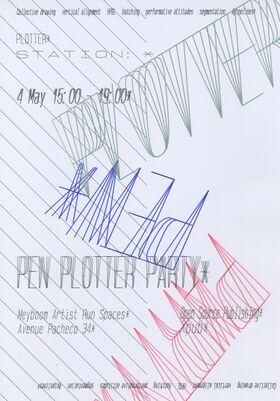
|
Relation to a wider context
Some of the wider context has already been discussed (including the community we are building around pen plotters). Additionally, there is WORM's community building efforts, and their support for independent creators. The open call we are applying to consists of 4 projects. Publishing (which we are applying to), exhibition, experimental performance and club night concept.
Choices made
* Radio shows before or after publications? * Publications (partially) made through community events?

